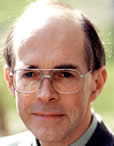

Oliver O’Donovan’s departure from Oxford is an omninous event. I wondered whether John Webster (on the right) was over-reacting when he decamped north, but it is now clear that he was not. If you want to see what is at issue, compare Webster with the man who was put in to replace him. Webster, an evangelical theologian and natural teacher and communicator, has done some great work interpreting Barth and Jüngel, the outstanding evangelical theologians of the twentieth century, and has now started on more constructive and creative theology, to show the relationship of Scripture, doctrine and ethics. Webster promises he is at work on a theological commentary of Ephesians, so this theologian is actually doing some interpretation of Scripture to show us what difference it makes, which is exactly what theologians should do, you might think. See his Holiness – it is a gem, and the kind of thing we all wish we could write. Compare this with the man who replaced him as Lady Margaret Professor of Divinity, whose latest offering takes up ‘the critique of theology found in the work of Heidegger’, and whose lecture courses seem hardly aware of Christian doctrine or its great exponents. One cares for the Christian theological tradition, the other does not, indeed believes that theology is crisis, and is intent on running it down.
This is one of those moments when the struggle for the Christian faith impacts on lives and careers in the comfortable West. I doubt whether Oxford’s administrators are troubled about losing these two scholars, because it is these administrators in every university in England who are making it so difficult to do any academic theological work. Administrators, and those who sit on appointments panels, are those teachers of humanities subjects who have run out of things to say and given up teaching. If they believe that theology is in crisis, they are wrong. The humanities are in crisis. Theology is the only part of the humanities that is not in crisis. Because theology has a gospel it has something to say. Theology believes in education and passing on a tradition of thought, and it so it has plenty to contribute to the university. The administrators appoint to theological positions people who have never learned, or learned to love, the Christian tradition of doctrine, and whose assumption that the Christian tradition is in crisis is never challenged by serious engagement with that tradition. There is no one more articulate about the crisis of the humanities and its origin than Oliver O’Donovan, see his Ways of Judgment, and Bonds of Imperfection and The Desire of the Nations – though Webster is not far behind. But what makes this so unusual is that O’Donovan and Webster were Canons of Christ Church, senior clergymen of the Church of England, employed by the Cathedral to teach Christian doctrine in the university. In twenty years time, when the university has finally disappeared up its own backside, the Christians will be meeting in the back of cathedrals and re-inventing the university there, just like last time.
